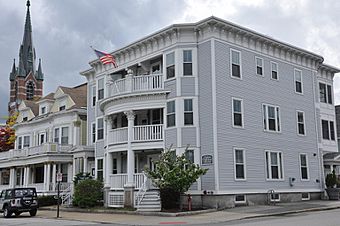America's Credit Union Museum facts for kids
Quick facts for kids |
|
|
Building at 418–420 Notre Dame Ave.
|
|
 |
|
| Location | 420 Notre Dame Ave., Manchester, New Hampshire |
|---|---|
| Area | less than one acre |
| Built | 1907 |
| Architectural style | Classical Revival |
| NRHP reference No. | 96001467 |
| Added to NRHP | December 20, 1996 |
America's Credit Union Museum is a unique place in Manchester, New Hampshire. It stands on the exact spot where the very first credit union in the United States began. This museum helps tell the story of how credit unions started and grew across the country.
The building itself has a rich history. It was once the home of the first credit union, which was originally called St. Mary's Cooperative Credit Association. Later, in 1925, its name changed to La Caisse Populaire Ste.-Marie, which means "Bank of the People, St. Mary's." Because of its important history, the building was added to the National Register of Historic Places in 1996. It is officially known there as the Building at 418–420 Notre Dame Ave.
Contents
What is a Credit Union?
A credit union is a lot like a bank, but with a big difference. Instead of being owned by shareholders, a credit union is owned by its members. This means that people who save money or borrow from the credit union are also its owners. Credit unions often focus on helping their members and the local community. They aim to provide fair financial services to everyone.
The Museum Building's Story
The building that is now the museum was built in 1907. It started as a three-story home with three separate apartments. One of its residents was Joseph Boivin. He was the manager of the St. Mary's Cooperative Credit Association. Mr. Boivin, along with Monsignor Pierre Hevey and Alphonse Desjardins, helped start this very first credit union.
Years later, Mr. and Mrs. Armand Lemire generously donated the building to become a museum. This allowed the important history of credit unions to be shared with everyone.
Exploring the Museum
Today, the museum's first two floors are filled with exhibits. These exhibits show the history of credit unions in the United States.
The Early Years: 1908 to 1933
The first floor of the museum takes you back to the beginning. It honors the founding era of credit unions, from 1908 to 1933. You can learn about the challenges people faced and how credit unions offered a new way for communities to help each other financially.
Growth and Expansion: From 1934 Onward
The second floor continues the story from 1934. Here, you'll find historical items that show how credit unions grew. This includes information about the Estes Park conference. This important meeting led to the creation of the Credit Union National Association. You can also learn about the 1934 Federal Credit Union Act. This law made it possible for credit unions to be set up in every state across the nation.
Meeting Space
The third floor of the museum is a large meeting space. It can hold up to 85 people and has modern equipment like LCD projectors. This area is often used for educational events and gatherings.
See also
- National Register of Historic Places listings in Hillsborough County, New Hampshire
- Sainte Marie Roman Catholic Church Parish Historic District and Ste. Marie Church (Manchester, New Hampshire), also located on Notre Dame Avenue in Manchester
- New Hampshire Historical Marker No. 208: St. Mary's Bank Credit Union / La Caisse Populaire Sainte-Marie
- History of credit unions
- Monsignor Pierre Hevey
- Edward Filene
 | Kyle Baker |
 | Joseph Yoakum |
 | Laura Wheeler Waring |
 | Henry Ossawa Tanner |



